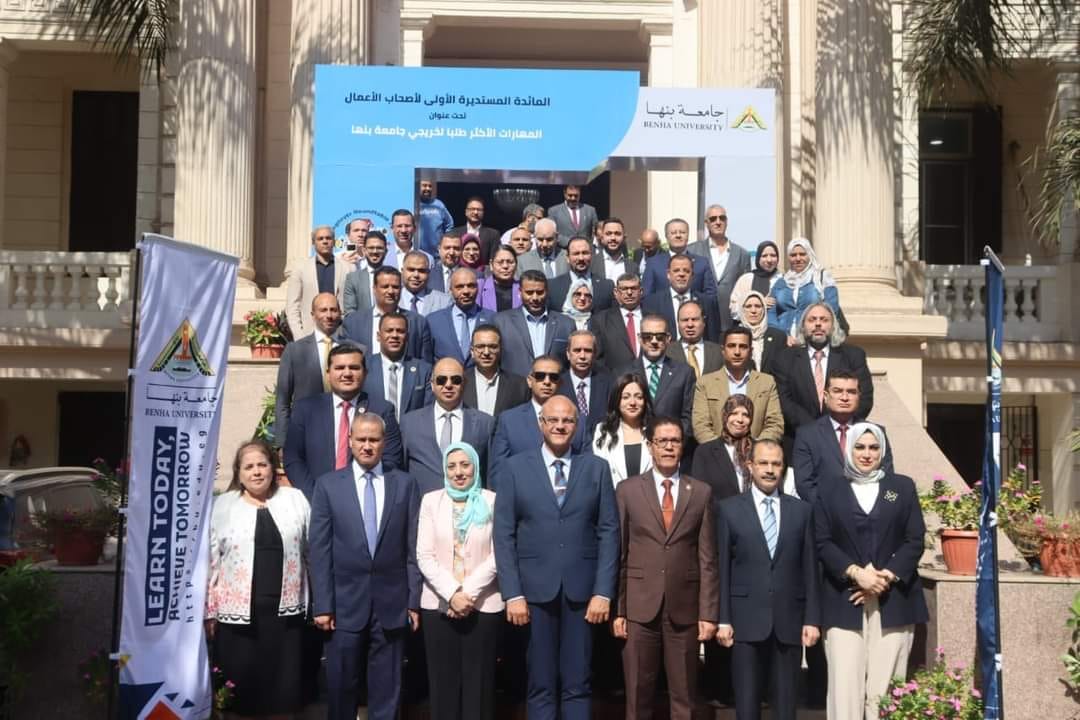Views: 364
Last visit: 2026-02-21 09:58:53

"Atteya" emphasizes the importance of investing in youth and preparing them for the labor market.
"El-Gizawy" stresses enhancing cooperation between the university and industrial institutions to create sustainable job opportunities for graduates.
Engineer Ayman Atteya, Governor of Kalyobiya, and Prof. Nasser El-Gizawy, President of Benha University, attended the first roundtable for business owners to discuss the skills required for the labor market.
This event was organized by the university's Professional Development Center in collaboration with the American University in Cairo.
The meeting was attended by Prof.ElSayed Fouda, Vice President for Community Service and Environmental Development, Prof. Jihan Abdel-Hadi, Vice President for Post Graduate Studies and Research, deans of faculties, the university's Secretary-General, and numerous representatives from industry, civil society, and academic and executive bodies across various disciplines.
In his speech, the Governor of Kalyobiya expressed his happiness to participate in the roundtable alongside a group of experts, academics, and decision-makers to discuss a vital issue: preparing our graduates for the ever-changing labor market. He emphasized that investing in youth is an investment in the future of our governorate and our nation, assuring that we are determined to provide all necessary support to our graduates to enable them to secure suitable job opportunities.
The Governor added that he hopes this meeting will yield results that graduates can refer to as a guide in their professional lives, noting the need to prepare youth by enhancing their personal and professional skills, developing self-awareness, learning languages and computer skills, using technology, mastering teamwork, time management, problem-solving, and decision-making.
He also highlighted the importance of focusing on pre-university education and guiding students toward fields that align with their interests and aspirations.
The Governor called for a focus on skill development in preparation for the labor market, as well as familiarizing students with various funding sources. He pointed out that the governorate has numerous industrial hubs ready to support graduates, ensuring they are directly qualified for the labor market, alongside many industrial zones that host hundreds of factories and companies.
In his address, Prof. Nasser El-Gizawy confirmed that the Egyptian state is keen on improving the quality of education, noting that over the past ten years, the state has provided education at all levels, resulting in 120 universities, including public, private, community, technological, and international institutions.
El-Gizawy highlighted that the university is committed to investing in its graduates by continuously developing new academic programs aimed at equipping students with the skills necessary to compete in the labor market and future jobs across various fields locally, regionally, and internationally. He also emphasized the importance of strengthening cooperation between academic institutions and industrial sectors to create sustainable job opportunities for graduates.
Furthermore, the university president discussed the significance of the University Career Centers project to support students and graduates by providing them with the necessary skills for the labor market through various essential training programs.
He praised the role of the university's Professional Development Center in executing the first roundtable with business leaders and company owners to gather information on integrating graduates into the labor market by identifying the skills needed for suitable job opportunities.
El-Gizawy added that the roundtable discussed the essential skills that university graduates should possess, recruitment mechanisms, current job needs of employers, and opportunities for collaboration and support between the university and the private sector.
At the end of the meeting, participants made several recommendations, including:
• Educational programs and curricula should be based on a thorough study of current and future labor market needs.
• Incorporate more practical activities, projects, and internships to provide students with real experience.
• Ensure the availability of modern technology and innovative tools in curricula, such as artificial intelligence, data analysis, and the Internet of Things, among other fields.
• Establish partnerships with companies and institutions to provide training and employment opportunities for students.
• Continuously develop educational and training programs for graduates to keep pace with rapid developments in various fields.
Participants also recommended enhancing critical thinking and creativity skills through practical assessments and open discussions, integrating leadership, teamwork, and time management skills into the curricula, and providing opportunities for students to learn through interdisciplinary studies to broaden their knowledge and skills.
They suggested developing online educational platforms that offer diverse and interactive content accessible to students anytime and anywhere, as well as using continuous assessments instead of only final exams to ensure students fully understand the material throughout the academic year.
Additionally, the meeting recommended regularly soliciting student feedback to improve and develop curricula based on their actual experiences, encouraging collaboration among students from different disciplines on joint projects to develop teamwork and problem-solving skills, and incorporating experiential learning methods such as field trips, laboratories, and practical projects to enhance real-world understanding of academic subjects.
They also proposed adding courses on scientific research skills, entrepreneurship, and innovation to the educational programs.
Participants emphasized that universities should include pathways for academic learning and another for technological education, encouraging universities to establish dual or joint degrees with regional and international universities.
They also suggested linking curricula to sustainable development goals and providing fast-track graduation options within educational programs, as well as fostering foreign language speaking skills among students.
On the sidelines of the meeting, the Governor of Kalyobiya and the President of Benha University signed several memorandums of understanding between the university and various industrial and economic entities.
Source: Sector of University President
Keywords:
Benha University © 2020 Designed and developed by portal team - Benha University